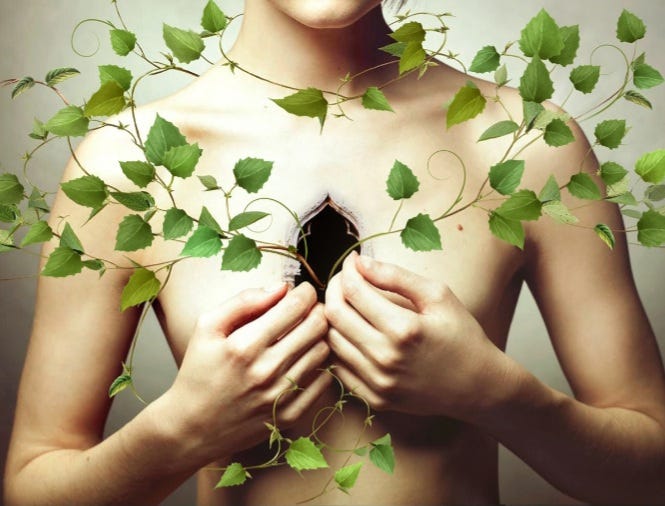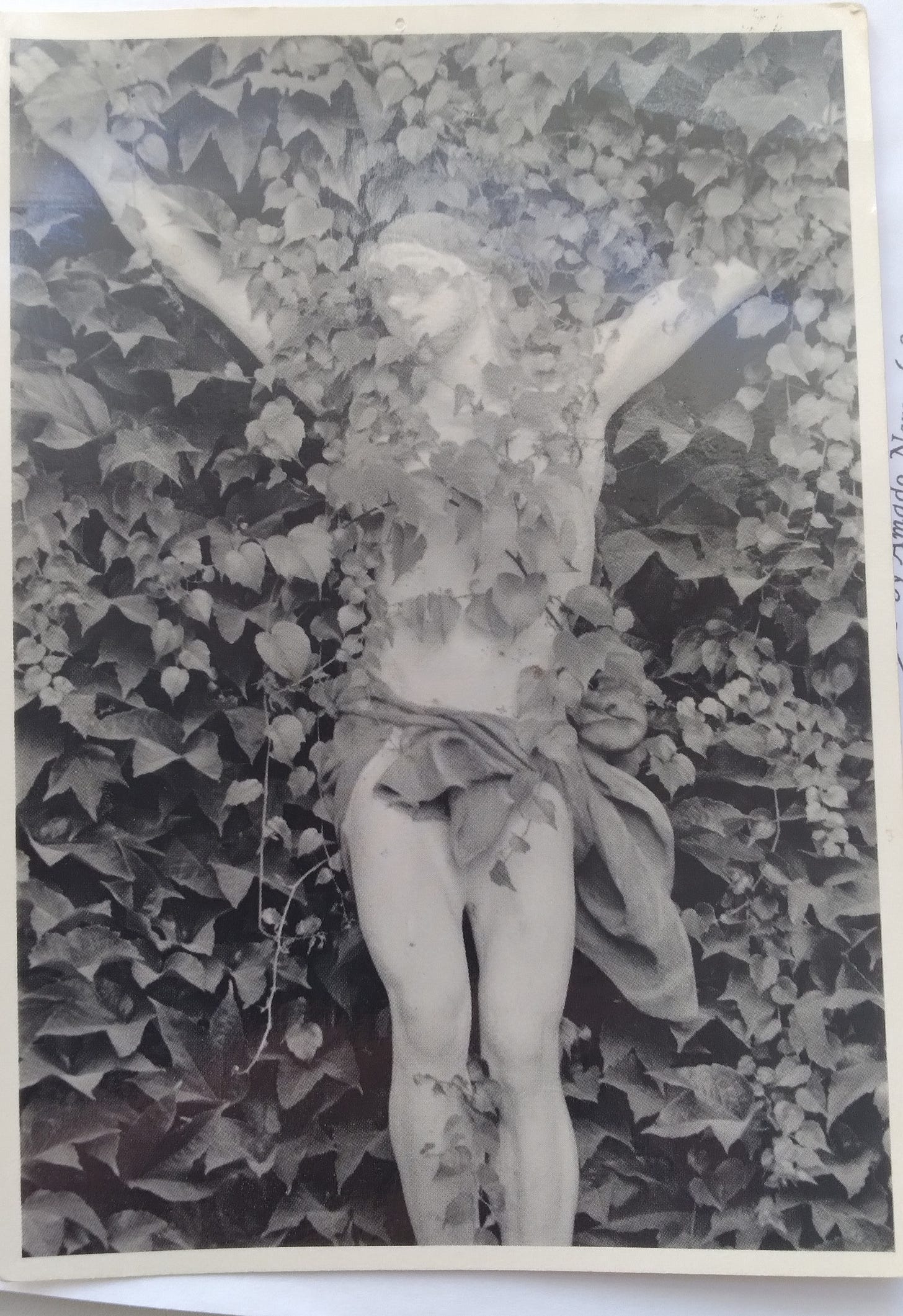Note the beautiful image by digital artist, Joan Proudman. She has work in the most recent volume of Jesus the Imagination (she’s definitely a kindred spirit). You can see more of her work here.
I try to get up early most days, usually before six, so I can work on poetry before the responsibilities of the day impose themselves upon me. As I mentioned before, I’m on the home stretch of my poetry manuscript, Mythologies of the Wild of God, and hope to finish by the end of the month.
One day last week I opened up the document on my laptop without any idea of what I wanted to write about. Then I noticed that I had written only a title, “Thalia,” at the top of one page. I had forgotten all about it (I’d only written it a day or two before!). Sometimes I will do this as a way to give myself a prompt the next time I got to work. Ernest Hemingway used to leave his writing for the day in the middle of a sentence, so he could just keep going the next time he got to work. That’s kind of what I was doing. Anyway, I still didn’t know what to write—so I looked up the 17th century alchemist and Anglican priest Thomas Vaughan’s writings that mention Thalia, who in Greek myth is the muse of comedy. In his work, Thalia is a cipher for his wife, Rebecca, who unfortunately died prematurely. It’s a very sophianic image. That gave me a start, but I was still lacking in inspiration. Then I looked through some old notebooks and dream journals, and then something started to take shape. I’m not even sure what to call it. Collage? A collection of fragments? Free association? Whatever it is, I think I like how it came out. You can read it below.
NOTES ON THALIA
“For God gave me unerring knowledge of what exists...the varieties of plants and the virtues of roots; I learned both what is secret and what is manifest, for Wisdom, the fashioner of All Things, taught me.” Wisdom 7:17, 20-22
The cool breath of the forest Comes to me up the trail At the edge of the warm meadow, And for a moment the barnyard Ducks and geese grow silent. Breath, the aegis of the living. . . But who calls me by this emissary?
“I have many names,” said she, “but my best and dearest is Thalia, for I am always green and shall never wither.” ~ Thomas Vaughan, Lumen de Lumine (1651)
Bonnie seeds green cabbage in the greenhouse, Tending the tiny seeds with the same grace she tends her children. She mixes compost and green sand with the seed starter And fills seed trays made from old pallet wood with this dark richness To ensure her green children live in the light of the sun and of viriditas.
“Wan dye Frucht meyens baums wyrt vollends verschmelzen, werde ych aufwachen und eyn muter syn eynes Konygs.”
A women’s monastery in the woods. . . But they are unsure of their vocation. A green halo, almost a flame, around the rose. The garden all green and flourishing. But it’s winter. What is a garden? Transfiguration.
“I turned back to looke upon my Wife, and shee appeared to me in greene silks down to the ground, and much taller, and slenderer then she was in her life time, but in her face there was so much glorie, and beautie, that noe Angell in Heaven can have more.” ~ Thomas Vaughan, dream of 9 April 1659.
Tinctures of turkey tail mushrooms, Propolis, valerian, and motherwort Sit curing on the kitchen counter: Antidotes for the poisons of the Archons.
MOTHERWORT “Venus owns the herb, and it is under Leo. There is no better herb to take melancholy vapours from the heart, to strengthen it, and make a merry, cheerful, blithe soul than this herb. It may be kept in syrup or conserve; therefore the Latins called it Cardiaca. Besides, it makes women joyful mothers of children, and settles their wombs as they should be, therefore we call it Motherwort.” Nicholas Culpepper, The Complete Herbal (1653))
A dream: Two star-women have fallen from the sky and have been placed under my care. They seem to be slightly injured, so I will have to carry them. A man speaks to me, and I explain all this to him. The women are very heavy. One of them is finally able to walk, so I set her down. The man tells me she has a burn on her face. I inspect the wound. It sparkles. 25 December 2018
I am in the garden, planting roses, when A fawn wanders shyly from the woods, Nibbling at the leaves of the crab apples. The fawn, its white spots like stars, Sees me and slowly approaches, Unafraid and curious, then nuzzles my Hand like a puppy. I look for its mother, But instead see its father come from the woods. His magnificent antlers are draped in a kind Of green and mossy gauze woven with vines.
“My dear friends, mankind has long ago forgotten why the songbirds sing. It is true that men have preserved the art of song, the art of poetry, but in the Age of Intellectualism in which the intellect has dominated everything, they have forgotten the connection of singing with the whole universe.” ~ Rudolf Steiner (1923)
Over my desk hangs an old French postcard,
A daguerreotype taken outside a church:
Jesus on the cross, covered with ivy.
But there is no cross, only ivy. He
Raises his arms as if he would embrace
The sky, as if death, like ivy, might matter.
The ivy drapes his shoulders and his chest,
Like a green tallit woven by nature,
Or that the vines grow out of his body.
Hic est corpus meum.“her last the last kiss was as if as the bird, only freed from the cage in my hand, had flown to my shoulder a moment and brushed my cheek before she flew into the woods” (Note found in a discarded copy of Khalil Gibran’s The Prophet, inscribed “For Jeanne’s PROPHET* *122969”)
The eschaton is within you.




Love the voice here Michael, allowing us to experience your encounters of beings and dimensions --- Thalia to star women -- pen to garden, earth to sky. Bravo and heartfelt thanks.
From Robert Grant, “Eusebius was well aware that many Christians were deeply suspicious of the speculative, philosophy-oriented theology that had long flourished at Alexandria and had later been transplanted to his native city of Caesarea in Palestine.” On that count nothing has changed.
But you poetic assemblage brought to mind our strongest medicine, speculative theology. Without it nothing of any consequence will survive the terror we live in.